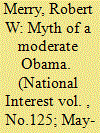| Srl | Item |
| 1 |
ID:
121567


|
|
|
|
|
| Publication |
2013.
|
| Summary/Abstract |
SCHOLARS AND specialists often lament that once the United States commits itself to a course of action abroad, it rarely adjusts its path. Bureaucracies prize continuity over innovation and cling to the prevailing orthodoxy. Top officials often embrace positions predetermined by past prejudices and lessons. The gravitational pull of politics induces presidents and secretaries of state to persist with existing policies even when they aren't working. Although such inflexibility may not be particularly harmful in ordinary times, big problems can arise when the United States finds itself in uncharted territory or facing unexpected geopolitical shifts.
|
|
|
|
|
|
|
|
|
|
|
|
|
|
|
|
| 2 |
ID:
121566


|
|
|
|
|
| Publication |
2013.
|
| Summary/Abstract |
THE OFFICE of the assistant to the president for national-security affairs in the West Wing of the White House is a spacious, well-lit corner room in a building where space is at a premium. It contains not only the national-security adviser's large desk but also a table for lunch discussions and other small meetings as well as a couch and easy chairs for more relaxed discussions. In April 2007, this commodious setting was the scene of a remarkable meeting. Stephen Hadley, the national-security adviser at the time, welcomed Meir Dagan, head of Israel's Mossad intelligence service, who came with a special briefing for his American host. Dagan revealed a secret nuclear reactor in the final stages of construction in the Syrian desert, developed with the help of North Korea. Knowledge of this project constituted a stunning intelligence coup for Israel.
|
|
|
|
|
|
|
|
|
|
|
|
|
|
|
|
| 3 |
ID:
121568


|
|
|
|
|
| Publication |
2013.
|
| Summary/Abstract |
WE ARE told these days that Karl Marx-one of the most influential thinkers of the nineteenth century, if not the single most important one-is enjoying a kind of renaissance. This is attributed by some to the great economic crisis that began in 2008 and destroyed considerable wealth around the world. Given that this crisis is seen widely as a crisis of capitalism, it is natural that many people would think of Marx, who was of course the greatest critic of capitalism in history.
|
|
|
|
|
|
|
|
|
|
|
|
|
|
|
|
| 4 |
ID:
121563


|
|
|
|
|
| Publication |
2013.
|
| Summary/Abstract |
THE GREATEST myth in American politics today is the view, perpetrated by the Democratic Left and elements of the news media, that Barack Obama is a political moderate. In truth he represents an ideology that is barely within the American mainstream as understood over two and a quarter centuries of political experience. Indeed, the crisis of American politics in our time is a crisis of political deadlock, and it is a deadlock born largely of the president's resolve to push an agenda for which he has no clear national consensus.
|
|
|
|
|
|
|
|
|
|
|
|
|
|
|
|
| 5 |
ID:
121565


|
|
|
|
|
| Publication |
2013.
|
| Summary/Abstract |
CARL GERSHMAN has the confident air of a man who knows his importance in Washington. As president of the congressionally funded National Endowment for Democracy (NED), he oversees an organization of 171 employees. In 2012, his organization dispensed approximately 1,236 grants, averaging some $50,000 each-a total of close to $62 million-to nongovernmental organizations (NGOs) in ninety-two countries.
|
|
|
|
|
|
|
|
|
|
|
|
|
|
|
|
| 6 |
ID:
121564


|
|
|
|
|
| Publication |
2013.
|
| Summary/Abstract |
OVER THE last months before his much-lamented death in August 2010, Tony Judt talked at length with Timothy Snyder, his friend and fellow historian. Their conversations, published after Judt died as Thinking the Twentieth Century, were about "the politics of ideas," the subject of the book on which Judt had embarked after Postwar, his splendid history of Europe since V-E Day, but which he knew he would not live to write. Some of these political ideas had affected him personally, in particular Zionism. As a schoolboy in London and a Cambridge undergraduate, Judt had been not only a committed supporter but also an energetic activist in Dror, a small socialist-Zionist group. He spent summers working on a kibbutz and in 1967 flew to Israel in the hour of peril as the Six-Day War began.
|
|
|
|
|
|
|
|
|
|
|
|
|
|
|
|